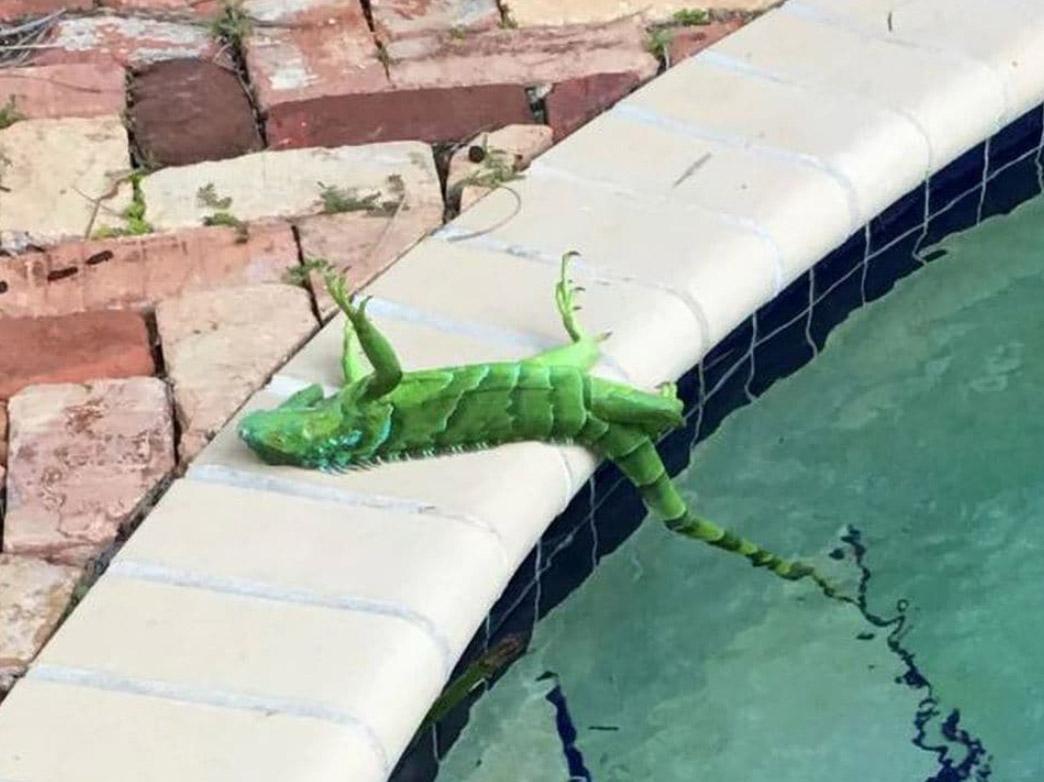Bomb cyclone: Frozen iguanas raining down from trees in Florida as temperatures plummet
Cold-blooded reptiles rendered immobile by freezing cold brought on by extreme winter weather
Your support helps us to tell the story
From reproductive rights to climate change to Big Tech, The Independent is on the ground when the story is developing. Whether it's investigating the financials of Elon Musk's pro-Trump PAC or producing our latest documentary, 'The A Word', which shines a light on the American women fighting for reproductive rights, we know how important it is to parse out the facts from the messaging.
At such a critical moment in US history, we need reporters on the ground. Your donation allows us to keep sending journalists to speak to both sides of the story.
The Independent is trusted by Americans across the entire political spectrum. And unlike many other quality news outlets, we choose not to lock Americans out of our reporting and analysis with paywalls. We believe quality journalism should be available to everyone, paid for by those who can afford it.
Your support makes all the difference.On Thursday morning, Frank Cerabino, a columnist for The Palm Beach Post, woke up to a 40-degree weather and was greeted by a “frozen iguana” lounging by his pool in Boca Raton, Florida.
He responded as many people probably would: he shared a photo on social media. Then he pondered, “What do you do?” he told The New York Times.
One of the strongest winter storms on the East Coast in modern history has pummelled cities with snow and sleet, forcing schools and businesses to close while grounding thousands of flights.
And in South Florida, it is “raining iguanas.”

Green iguanas, like all reptiles, are cold-blooded animals, so when the temperature falls to a certain level iguanas become immobile, said Kristen Sommers of the Florida Fish and Wildlife Conservation Commission. Under 50 degrees Fahrenheit, they become sluggish. Under 40 degrees, their blood stops moving as much, Sommers said.
They like to sit in trees,and “it's become cold enough that they fall out.”
This is not a new phenomenon - there were similar reports in 2008 and 2010 - though it is not typical.
“The reality is South Florida doesn't get that cold very often or long enough that you see this frequently,” Sommers said.
But what should one do with a fallen iguana?
Cerabino told The New York Times that he prodded the iguana with a pool skimmer.
“He didn't move,” Cerabino said. “But he's probably still alive. My experience is that they take a while to die.”
Maxine Bentzel, a reporter at CBS12 News, suggested that “iguanas have a good chance of thawing out if you move them into the sun.”
The experts would prefer you didn't.
Sommers said the reptiles could become frightened as they warm.
“Like any wild animal it will try to defend itself,” she said.
And there are cautionary tales.
Ron Magill of the Miami Zoo told WPLG TV in 2010 about a man who collected sleeping iguanas and threw them into the back of his station wagon. Then they awoke.
“All of a sudden these things are coming alive, crawling on his back and almost caused a wreck.”
The situation was much worse for iguanas in 2010, when temperatures in South Florida fell to the low 30s, The Sun Sentinel reported.
“Neighbourhoods resounded with the thud of iguanas dropping from trees onto patios and pool decks,” Sentinel reporter David Fleshler wrote.
Many iguanas died that year, as did other animals.
“Many pythons were reported dead, floating in the Everglades,” the Fish and Wildlife Commission said in a statement to The Palm Beach Post.
The deaths resulted from both the low temperatures and the length of time of the frigid weather.
The iguana population has since recovered, to the consternation of residents.
“We have been receiving more calls from people that are experiencing wildlife conflicts with iguanas... Iguanas in their yard that they are not happy about, you've seen them further north in large numbers,” Sommers said.
According to The Sentinel, iguanas arrived in Florida first as pets, and once they escaped or were freed by their owners, first moved into Miami-Dade County in 1966, then to the Keys in 1995, before making a home of Broward County in 2001 and in Palm Beach in 2003.
The winter storm sweeping across parts of the East Coast has prompted animal rescue organisations and local authorities to issue warnings about giving pets shelter, with dogs left out to freeze to death in the cold.
In South Florida, the cooler temperatures also affect sea turtles, manatees and other creatures that hang out in trees.
“Bats sometimes will fall out of the roost of trees when we have a pretty cold snap,” Sommers said.
Sommers said that while she's heard of falling iguanas on social media, the agency hasn't gotten any reports of falling iguanas.
“There have not been an influx of calls to FWC about people worried about iguanas falling out of trees,” she said. “It's not like something you see every year.”
But this is no ordinary weather.
On Thursday the National Weather Service issued a freeze warning for parts of South Florida.According to The Sun Sentinel, temperatures in the area will be the coldest since the cold snap in December of 2010.
The Washington Post

Join our commenting forum
Join thought-provoking conversations, follow other Independent readers and see their replies
Comments